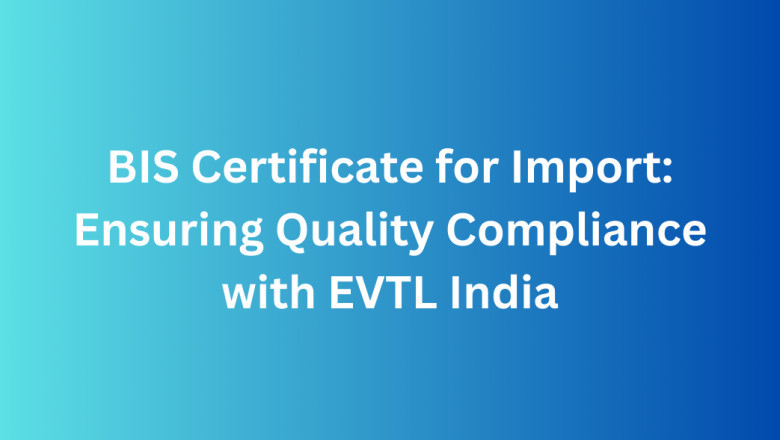views
Introduction to BIS Certification for Import
Importing products into India comes with a set of mandatory regulatory requirements. Among the most critical is obtaining a BIS Certificate for Import. Issued by the Bureau of Indian Standards (BIS), this certification ensures that products being brought into the country comply with prescribed Indian quality and safety standards. For businesses looking to import electronics, household items, industrial products, and other goods that fall under the BIS mandatory list, BIS Certification for Import is not just recommended, but legally required.
Without this certification, imported goods can be denied entry at Indian ports, resulting in delays, penalties, and financial losses. Therefore, it is essential for importers to understand the BIS certification process and ensure full compliance before initiating any import transactions.
What is BIS Certificate for Import?
The Bureau of Indian Standards (BIS) is the national standards body of India, responsible for setting quality benchmarks for various products and processes. A BIS Certificate for Import is a declaration that the imported product meets the applicable Indian Standard (IS) specifications and is safe for consumer use or industrial application.
Certain categories of products such as electronics, electrical appliances, IT equipment, batteries, lighting, and more are covered under the Compulsory Registration Scheme (CRS) or the ISI Certification Scheme depending on the nature of the product. In both cases, BIS certification is mandatory before such products can be imported and sold in India.
Importance of BIS Certification for Importers
Importers often source products from overseas manufacturers for better pricing, innovation, or quality. However, to protect consumers and maintain consistency in product standards, the Indian government requires importers to ensure that these products meet Indian safety and performance guidelines.
A valid BIS Certification for Import offers numerous advantages. It facilitates customs clearance, reduces the risk of goods being held at the port, and builds credibility in the marketplace. It also assures customers and retailers that the imported product is reliable and conforms to national quality expectations.
For businesses, timely acquisition of BIS certification translates to smoother logistics, legal compliance, and improved brand reputation.
The BIS Certification Process for Imported Products
The process of obtaining a BIS Certificate for Import involves several detailed steps. Initially, the importer must identify the Indian Standard applicable to the product. If the product falls under the Compulsory Registration Scheme (CRS), the foreign manufacturer must apply for registration, and the importer acts as the Authorized Indian Representative (AIR). In the case of ISI certification, the product and factory undergo a more comprehensive audit and testing process.
Samples of the product must be sent to BIS-approved labs for testing. The results must show full compliance with the relevant Indian Standard. Once the test results are positive and documentation is verified, BIS grants the certificate.
The certification is typically issued in the name of the foreign manufacturer but must be coordinated and managed by the Indian importer or their official representative. The entire process is technical and requires proper planning and accurate documentation to avoid rejection or delay.
Common Challenges Faced by Importers
The BIS certification procedure can be complex, especially for businesses unfamiliar with Indian regulatory frameworks. Importers often face challenges such as difficulty in identifying the correct Indian Standard, coordinating product testing in certified labs, language and communication barriers with foreign manufacturers, and managing documentation.
Any mistake in application forms, technical documentation, or product specifications can lead to the rejection of the application. Moreover, keeping up with regulatory updates and ensuring compliance with revised standards can be time-consuming and confusing without professional guidance.
EVTL India: Expert BIS Certification Consultant
To overcome these challenges and ensure a smooth certification journey, importers can rely on experienced consultants like EVTL India. As a trusted compliance partner, EVTL India specializes in providing BIS Certification for Import services for a wide range of products and industries.
EVTL India offers end-to-end support, from identifying applicable standards and preparing documentation to coordinating product testing and liaising with BIS officials. Their team of experts ensures that every requirement is met accurately and efficiently. For foreign manufacturers, EVTL India also acts as an Authorized Indian Representative when needed, further simplifying the process for international clients.
With a strong understanding of BIS procedures and vast experience in handling complex certification projects, EVTL India has built a reputation for reliability, transparency, and professionalism. Their services are tailored to reduce time, cost, and risk for importers looking to enter or expand their presence in the Indian market.
Conclusion
Securing a BIS Certificate for Import is an essential requirement for businesses dealing with regulated products in India. It ensures that goods meet national safety and quality standards, facilitates smooth customs clearance, and builds consumer trust.
Navigating the certification process can be challenging without the right expertise. That’s where EVTL India steps in as a reliable partner, providing expert consultancy and comprehensive assistance at every stage of the BIS certification journey. With EVTL India by your side, you can ensure full regulatory compliance, streamline your import operations, and focus on growing your business in the competitive Indian marketplace.














Comments
0 comment